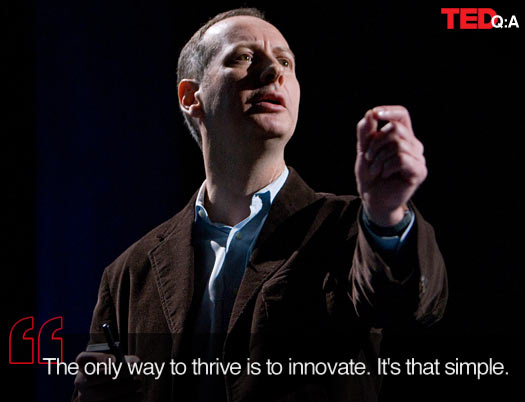Build a better mousetrap, the adage goes, and the world will beat a path to your door. That may sound good if you’re into killing small rodents—and many are: more than 4,400 patents for new mousetraps have been issued by the US Patent and Trademark Office—but in the rough-and-tumble world of business, it’s not so easy to gain competitive advantage and customer satisfaction. Alex Tabarrok, professor at economics at George Mason University, says that only one thing will provide an edge: innovation. In response, Tabarrok has come up with a plan to launch a new “Innovation Renaissance,” powered by such diverse elements as patent reform and an educational overhaul. He maps it out in his exciting new TED Book: Launching the Innovation Renaissance: A New Path To Get Smart Ideas to Market Fast. We recently spoke with Taborrak about his new book.
Why do we need a new path to innovation? What’s wrong with the old path?
Economists tell us that the recession ended in 2009, but unemployment, fear, and fitful growth tell us that the economy is still stagnating. That’s because we have deeper problems that we need to examine. The only way to thrive is to innovate. It’s that simple. So a reexamination of the motivations, foundations, and achievements of our innovation policy is in order. That’s what Launching the Innovation Renaissance is all about. None of us can rest on our past accomplishments.
How much of a roadblock is the patent system?
Rather than a roadblock, I’d said the current patent system is a thicket. It’s a thorny bramble of regulation and litigation that is slowing things down. Isaac Newton famously said that if he had seen further than others it was only by “standing on the shoulders of giants.” Today, Newton would have to pay dearly for that privilege and, as a result, I don’t think he would have seen so far.
Are patents even necessary?
Patents are like fertilizer. Applied wisely and sparingly, they can increase growth. But if you apply too many chemicals, or make patents too strong, then you can leach the land, making growth more difficult. We definitely need some serious patent reform to prune back the thicket and make more growth possible. Let’s consider one of the most important and innovative firms today. This company has revolutionized its industry and done more than any other for the American consumer. No, it’s not Apple. The iPad is cool but over the last several decades the most important and productive firm has been Walmart. In fact, Walmart alone was responsible for a large share of the productivity improvements in the late 1990s. Walmart is a very innovative firm but it holds almost no patents—only about 60 in total, including one for a convertible shoe box. In fact, most innovations in most industries are not patented, and many industries are innovative with few or no patents; fashion and jazz for example. So patents aren’t necessary for innovation.
What else can be done to spur innovation?
The most important is education. Consider the following: A typical worker will work for about 30 years, most US workers are educated in public schools, and a majority of GDP is worker compensation. So even a small improvement in education benefits a lot of workers for a long period of time. In this way even a small improvement in education can create trillions of dollars worth of value. It’s hard to think of another policy where small changes can be worth trillions of dollars.
But improving education isn’t easy. Many have tried and failed.
Getting better teachers into the classroom is incredibly important. It’s interesting to me that this approach is neither a left- nor right-wing approach. In contrast with many pundits on the right, though, I think cutting teacher salaries is nuts. We should pay teachers more, perhaps even a lot more if this means we can improve teacher quality. In contrast with many on the left, however, I think we need to test teachers in a better way and to use that information in hiring, firing, pay, promotion and training decisions. We do almost none of that now, and that is a scandal.
What is at stake if we don’t launch a new Innovation Renaissance?
It used to be that almost all innovation came from the U.S. and a small number of other developed countries. That’s no longer the case, and as China and India grow it’s changing even more. Expect a lot more Chinese and Indian Nobel prizes in the future. Our relative status in the world is falling. Some people see this as pessimistic. But, overall, I am optimistic about this change. You know, it would be really great if I discovered a cure for cancer ,but it would only be a little bit less great if my neighbor did. So I am pretty happy when my neighbor becomes wealthier, better educated and more innovative. I feel the same about China and India.
Launching the Innovation Renaissance is part of the TED Books series, which is available for the Kindle and Nook as well as on Apple’s iBookstore.

Comments (13)
Pingback: Spring Break Reading List « Seeing Beyond the Absurd
Pingback: NCN Articles of Interest 12/2/11 « National Creativity Network | Welcome to TH Creative Group homepage
Pingback: NCN Articles of Interest 12/2/11 « National Creativity Network